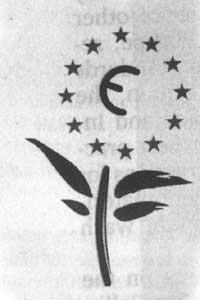European eco-label
“Green consumption” is an emerging phenomenon. It is increasingly common for labels claiming that they do not harm the environment to be seen in all kinds of products. The distrust of many consumers has grown to the same extent as green products, asking if what labels say is credible. Concerned about this problem, the European Economic Community Commission wants to launch a system for next October to ensure the authenticity of green labels.
Paper, detergents, sprays, electrors, etc. will be considered in this system but no food or medicine will be taken. The latter continue to have strict regulations and have not wanted to re-enter this subject. Products that meet established standards will be entitled to an “eco-label”. This eco-label will be flower shaped and will replace the petals by 12 stars of the European Union.

The definition of these standards has logically been the most important work. A new approach has been made for this. For example, in the case of a washing machine not only the consumption of use is taken into account but also the energy consumption of the manufacturing process and the consequences of transport. In this way, a complete life cycle analysis of the product is performed and the steps that have the greatest environmental impact in this cycle are defined.
However, despite having comprehensive information throughout the product lifecycle steps, some measure is needed to compare different types of contamination in order to make product comparisons. The concept of critical volume has been used to establish environmental impact equivalences. For example, if the allowable limit of a water pollutant is 1,000 ppm and another 500 ppm air pollutant, both figures are considered equivalent.
The approach is debatable, of course, but for now it is the most scientific form that has been found and will be presented for approval by the producer. On the other hand, this step by step analysis highlights the dimension of the responsibility of each of them, both the producer and the consumer or user.
As already mentioned, this scheme has wanted to add scientificity to the whole system, but the problem is more complicated. The desire to define a safe or environmentally acceptable consumption includes contradictions. Increasing the degree of information and awareness of producers and consumers requires a long way in the coming years.





